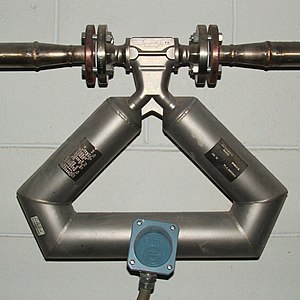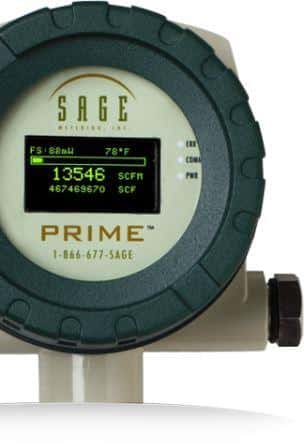We discuss the Coriolis flowmeter in part three of this series on natural gas flow meter types.
Natural Gas Flow Measurement
Our blog usually explores thermal mass flow meters because that is our business. While our meters serve various applications, there are additional devices that excel in other gas flow measurement areas. For this reason, we occasionally explore other gas meters. The Coriolis meter measures natural gas and is approved for use in custody transfer. While this meter type measures liquid and gas, this post highlights natural gas information.
In the market for a mass flow meter?
Coriolis Meter
 As the thermal mass flow meter, the Coriolis meter measures gas mass flow and is also known as an inertial flow meter. Many process plants have been replacing their differential pressure (DP) meters with Coriolis meters; although they are more expensive, they are considered a favorable investment. Additionally, there have been significant new product enhancements for Coriolis meters over the last few years, which has expanded the meter’s use in larger line sizes.
As the thermal mass flow meter, the Coriolis meter measures gas mass flow and is also known as an inertial flow meter. Many process plants have been replacing their differential pressure (DP) meters with Coriolis meters; although they are more expensive, they are considered a favorable investment. Additionally, there have been significant new product enhancements for Coriolis meters over the last few years, which has expanded the meter’s use in larger line sizes.
The Coriolis meter provides a direct mass flow measurement based on the deflection force of a fluid moving through an oscillating tube. For this style meter, the flow is measured by analyzing the changes in the Coriolis force of a flowing substance. The mass flowing through a tube creates a force proportional to the mass flow rate of that fluid.
Advantages
The Coriolis flowmeter is highly accurate, has high turndown capabilities, is reliable, and is approved for natural gas custody transfer. While approved for fiscal accounting, there has been some reluctance to use them in this capacity. The meters measure mass flow, not volumetric flow, so there is no need for pressure and temperature devices to calculate flow. They also have no internal moving parts, so there is very little maintenance, and they require very little attention once installed. They excel in line sizes of 2” and less.
Limitations
Of course, being the most accurate meter on the market comes at a cost, and Coriolis meters bear a high initial expense. Historically this meter type has been inflexible in pipes larger than 4,” however, over the last few years, there has been an entry of Coriolis meters for large pipeline sizes, including up to 14.” While this meter type is used to measure gas, they have an easier time measuring liquids over gases because gas usually has a much lower density than liquid
Manufacturers
Manufacturers of Coriolis flow meters include Endress+Hauser, FMC Technologies, GE Measurement & Control Solutions (Rheonik), Krohne, Micro Motion, and others.
Who are we?
We are Sage Metering. We manufacture thermal mass flow meters, which measure and monitor gas mass flow. If you are interested in a different meter style, may I suggest that you learn more about the advantages of thermal mass flow measurement? Otherwise, here are other links to articles sharing the benefits and limitations of each technology:
- Diaphragm meters
- Rotary meter
- Gas Turbine Meter
- Ultrasonic flowmeters
- Orifice plates
- Thermal mass flowmeter

